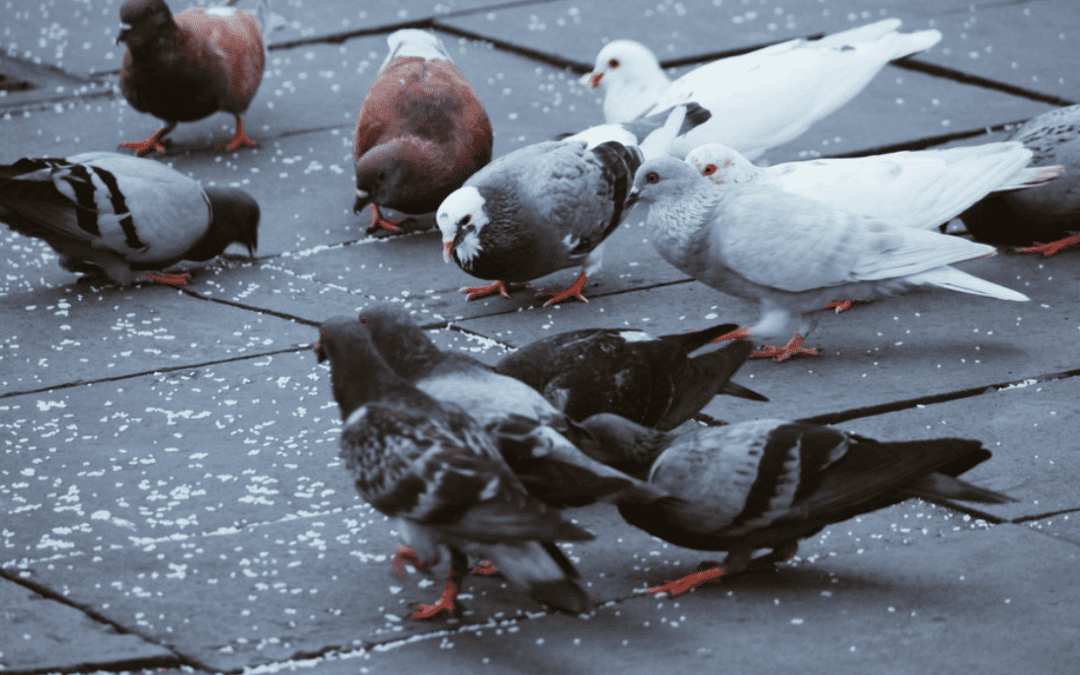
by Pigeon Patrol | Mar 7, 2022 | MBCA, pet bird, Pigeon Control, Pigeon Droppings, Pigeon Patrol's Services, Pigeon Predators
The world is urbanising rapidly, and it is predicted that by 2050, 66% of the global human population will be living in urban areas. Urbanisation is characterised by land-use changes such as increased residential housing, business development and transport infrastructure, resulting in habitat loss and fragmentation. Over the past two decades, interest has grown in how urbanisation influences fundamental aspects of avian biology such as life-history strategies, survival, breeding performance, behaviour and individual health. Here, we review current knowledge on how urbanisation influences the nesting biology of birds, which determines important fitness-associated processes such as nest predation and community assembly. We identify three major research areas: (i) nest sites of birds in urban areas, (ii) the composition of their nests, and (iii) how these aspects of their nesting biology influence their persistence (and therefore conservation efforts) in urban areas. We show that birds inhabiting urban areas nest in a wide variety of locations, some beneficial through exploitation of otherwise relatively empty avian ecological niches, but others detrimental when birds breed in ecological traps. We describe urban-associated changes in nesting materials such as plastic and cigarette butts, and discuss several functional hypotheses that propose the adaptive value and potential costs of this new nesting strategy. Urban areas provide a relatively new habitat in which to conserve birds, and we show that nestboxes and other artificial nest sites can be used successfully to conserve some, but not all, bird species. Finally, we identify those subject areas that warrant further research attention in the hope of advancing our understanding of the nesting biology of birds in urban areas.
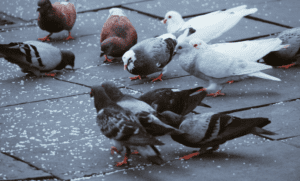
Source
Pigeon Patrol Products & Services is the leading manufacturer and distributor of bird deterrent (control) products in Canada. Pigeon Patrol products have solved pest bird problems in industrial, commercial, and residential settings since 2000, by using safe and humane bird deterrents with only bird and animal friendly solutions. At Pigeon Patrol, we manufacture and offer a variety of bird deterrents, ranging from Ultra-flex Bird Spikes with UV protection, Bird Netting, 4-S Bird Gel and the best Ultrasonic and audible sound devices on the market today.
Voted Best Canadian wholesaler for Bird Deterrent products ten years in a row.
Contact us at 1- 877– 4– NO-BIRD, (604) 585-9279 or visit our website at www.pigeonpatrol.ca
Pigeon/Pigeon Patrol / Pigeons Roosting / Vancouver Pigeon Control /Bird Spikes / Bird Control / Bird Deterrent / Pigeon Deterrent? Surrey Pigeon Control / Pest /Seagull deterrent / Vancouver Pigeon Blog / Birds Inside Home / Pigeons in the cities / Ice Pigeons/ What to do about pigeons/ sparrows , Damage by Sparrows, How To Keep Raccoons Away, Why Are Raccoons Considered Pests/ De-fence / Pigeon Nesting/ Bird Droppings / Pigeon Dropping/ woodpecker control/ Professional Bird Control Company/ Keep The Birds Away/ Birds/rats/ seagull/pigeon/woodpecker/ dove/sparrow/pidgeon control/pidgeon problem/ pidgeon control/flying rats/ pigeon Problems/ bird netting/bird gel/bird spray/bird nails/ bird guard
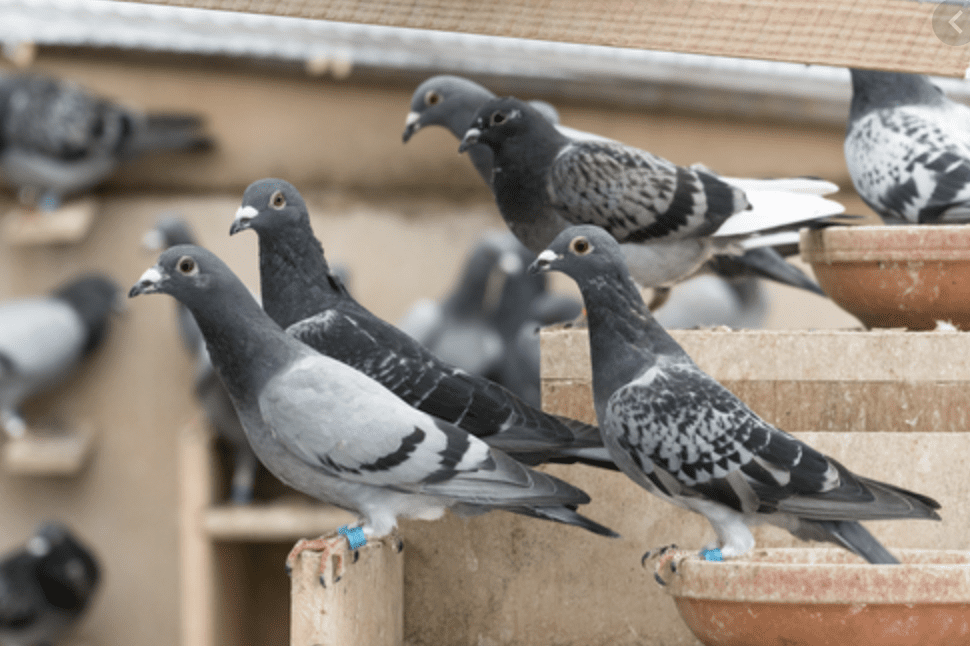
by Pigeon Patrol | Mar 7, 2022 | history of pigeons, MBCA, pet bird, Pigeon Control, Pigeon Droppings, Pigeon Patrol's Services, Pigeon Predators
Impatient for winter to be over, we had put on our boots to go seeking signs of spring but had instead found a sign of the previous summer. We must have walked past this thicket a score of times last summer without ever noticing birds around it, but here is a bird’s nest among the branches, at eye level, in plain sight now that winter has stripped away the last of the leaves.
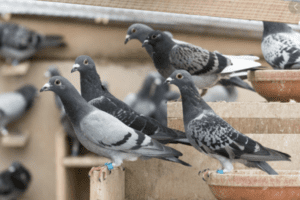
It would be easy enough to pass it by. If we pause to look closely, though, it becomes more intriguing. We may never know what kind of bird built the nest, because there are several species here that might construct this type: an open-cup shape lashed into a three-way fork in an upright twig. But it inspires a sense of wonder beyond mere questions about identification. Somehow a small bird knew how to gather the myriad materials for this structure. Somehow this bird arranged scores of small pieces of twig and grass and weed and bark, weaving them together with such precision that the nest is still sturdy and secure after being exposed to the winter’s rain and wind. Considered in the proper light, this little bundle of dried vegetation is really a small miracle.
“My favorite palette is the color of winter decay,” says photographic artist Sharon Beals. It’s 7 a.m. in San Francisco, but she is already on her way out the door to work on her project for the day. Much of her professional photography takes her outside, “wandering a river for hours, looking at bugs, muck, and minnows,” as she says, or photographing native plants or their pollinators. Today, though, she will spend up to 11 hours in a museum, examining birds’ nests and photographing many of them. The results will add to her growing collection of nest portraits—extraordinarily detailed images that have already wowed scientists and artists alike.
Beals became immersed in this subject almost by chance when a friend, knowing her fascination with the subtle minutiae of nature, brought her an abandoned bird nest. Studying it, she knew she had to find a way to capture its intricacy. Using a very high-resolution flatbed scanner, she made images of this nest, and then another, and another.
But problems loomed. For one thing, she says, after turning a nest upside down on the scanner, she might have to spend hours cleaning all the dust that falls from the nests off the images in Photoshop. For another, as she discovered, possessing these nests was illegal.
Beals overcame the first challenge by moving to very high-resolution cameras and by taking multiple exposures, focusing on different planes, then melding the images together. But the second problem was tougher. The laws protecting U.S. birds are far more sweeping than most people imagine. Without special permits, it is illegal for private citizens to possess most species of native birds, or their feathers, or their eggs, or even their abandoned nests. The laws may seem excessive, but they were enacted at a time when our birds were under siege from commercial plume hunters and recreational egg collectors, and they were written to be wide-ranging and inclusive. Rather than give up or break the law, Beals turned to the Museum of Vertebrate Zoology and the California Academy of Sciences, and soon had permission to come in and photograph nests from among the hundreds in the institutions’ specimen collections.
The popular image of natural history museums may be of a handful of stuffed creatures on public display in glass cases, but most keep the majority of their specimens in research collections out of public view. The nests at the California Academy of Sciences were mostly collected decades ago, at a time when relatively little was known about birds’ habits. These specimens provided basic data points then, and they continue to be scientifically valuable today.
For Sharon Beals, they also provided a treasure trove of artistic possibilities. She spent days at the academy, examining and photographing nests. “These first images gave me the satisfaction of seeing the materials on almost a cellular level,” she says. “I loved the quiet, subdued palette, and the shapes created by the form-follows-function art of the nest builders themselves. I loved the amazing variety of content and construction, the way the materials became like line and brushstroke.” When she began printing the images larger than life, on sheets of fine etching paper two feet across, others shared her enthusiasm. Visitors to her studio were fascinated. Almost invariably they became intensely curious. Beals had found a way to make people see the nests, truly see them, as cause for wonder and for endless questions about the birds that built them.
Birds do not live in their nests the way humans live in their houses. A few species, such as some wrens, will use them as shelters to sleep in at night, but they are the exceptions. For the majority, the nest is just a cradle. Built to hold the eggs and the helpless young, it is abandoned once the young birds are old enough to leave. In most cases it is never used again.
There is evidence that some dinosaurs built primitive nests on the ground and even cared for their hatchlings there. Today many creatures besides birds—from wasps to mice to alligators—shelter their young or their eggs in nests that they construct themselves. But for variety of placement and material, and for sheer complexity of design, nothing can compare with birds’ nests. Especially among smaller birds, nests are often remarkable for their inventive use of local materials to provide support, shelter, and camouflage. The nests are tiny marvels of disposable architecture.
The skill to create them comes almost entirely from instinct (although there is evidence that young adult birds, making their first nests, do improve with practice). Studies have shown that at least some birds, hand-raised in captivity, can build a nest typical of their own species without ever having seen one. The instinct to do this must be flexible, because the locations and materials available for nests in the wild vary, but it must be based on a considerable amount of precision as well.
Even a small bird’s relatively simple nest may be composed of several kinds of material used for different purposes. For example, a white-crowned sparrow’s may have coarse twigs at the base, finer twigs and weeds intertwined with rootlets and bark strips to form the open cup, dry leaves in the outer edge, and fine grasses and other soft materials molded into an inner lining. And that’s just a simple number. A more complex nest, such as the long hanging pouch of an American oriole, may involve actual weaving or sophisticated knots tied in long plant fibers, and it may take days of intense effort to build.
Most birds are opportunistic when it comes to building materials, and will readily incorporate manmade items into their nests if they fit basic requirements of size and texture. Paper, string, nails, pieces of wire, and bits of fabric regularly show up in the handiwork of suburban birds. In some areas house finches have become a minor nuisance by dismantling nylon window screens to use the strands for their nests.
In many cases, though, the materials chosen must have specific properties. Studies of nesting European starlings have found that the birds were selecting certain plants, such as wild carrot and yarrow, containing chemicals that would inhibit the growth of mites and other parasites. In eastern North America the great crested flycatcher often adds a piece of shed snakeskin, and the power of suggestion imparted may help deter predators or other intruders. Chipping sparrows often use animal hair (gathered in farmyards, or even plucked from startled pets) for their nest lining. Feathers are also ideal for soft, insulating lining material. Big birds like quail or ducks use their own down feathers for this purpose, but swallows and other small birds prefer feathers dropped by larger birds. A truly extreme example of material gathering is practiced by certain tropical swifts, fast-flying small birds that will actually strike much larger birds in midair to knock feathers loose.
As a very general rule, females are the skilled builders. For many species they do all the construction, including some (such as hummingbirds) for which males abdicate any responsibility for helping with the nest or young. In other cases, the male provides the basic foundation and the female adds the detailed lining. A male marsh wren may build 20 or more “dummy nests” around his territory; the female chooses one, adds lining, and uses it as the actual site for the eggs. The male’s building spree is not wasted effort: The presence of all those decoys may provide some protection for the real one, as predators tire of raiding nests that turn out to be empty.
Some of the most impressive nests are also among the smallest. A hummingbird nest is a wondrous creation of tiny plant fibers, mosses, and spiderwebs, so small that a 50-cent piece would completely cover it. It is as soft as felt but strong, with the spiderwebs making it pliable enough to stretch and expand as the rambunctious young hummers grow and exercise in it. Many hummingbirds will camouflage the outside with bits of lichen. At a distance such an object looks, for all the world, like a natural bump or knob on the branch, thereby deceiving potential predators in the mother bird’s absence.
At the opposite extreme are eagles. A pair of bald eagles may use the same nest for years, adding material to it annually until it becomes huge (an extreme example can reach a depth of 20 feet and a weight exceeding two tons). Such a nest is merely a ramshackle heap of sticks, hardly an admirable piece of avian architecture, but it does have its admirers: House sparrows and other small birds sometimes tuck their own nests into the lower crevices, and great horned owls may commandeer the entire nest, perhaps even driving the eagles from their aerie.
The finest nests are crafted by smaller birds, however, and the majority are never reused, not even by their original builders. It seems all the more remarkable that birds should create these intricate structures for such ephemeral use. It seems ironic, too, that most of us are not legally allowed to possess these nests, even after they have been abandoned. But when we are lucky enough to find them in the wild, or see them revealed in works of photographic art like the ones reproduced here, we cannot avoid holding them and the birds that made them in absolute awe.
Source
Pigeon Patrol Products & Services is the leading manufacturer and distributor of bird deterrent (control) products in Canada. Pigeon Patrol products have solved pest bird problems in industrial, commercial, and residential settings since 2000, by using safe and humane bird deterrents with only bird and animal friendly solutions. At Pigeon Patrol, we manufacture and offer a variety of bird deterrents, ranging from Ultra-flex Bird Spikes with UV protection, Bird Netting, 4-S Bird Gel and the best Ultrasonic and audible sound devices on the market today.
Voted Best Canadian wholesaler for Bird Deterrent products ten years in a row.
Contact us at 1- 877– 4– NO-BIRD, (604) 585-9279 or visit our website at www.pigeonpatrol.ca
Pigeon/Pigeon Patrol / Pigeons Roosting / Vancouver Pigeon Control /Bird Spikes / Bird Control / Bird Deterrent / Pigeon Deterrent? Surrey Pigeon Control / Pest /Seagull deterrent / Vancouver Pigeon Blog / Birds Inside Home / Pigeons in the cities / Ice Pigeons/ What to do about pigeons/ sparrows , Damage by Sparrows, How To Keep Raccoons Away, Why Are Raccoons Considered Pests/ De-fence / Pigeon Nesting/ Bird Droppings / Pigeon Dropping/ woodpecker control/ Professional Bird Control Company/ Keep The Birds Away/ Birds/rats/ seagull/pigeon/woodpecker/ dove/sparrow/pidgeon control/pidgeon problem/ pidgeon control/flying rats/ pigeon Problems/ bird netting/bird gel/bird spray/bird nails/ bird guard
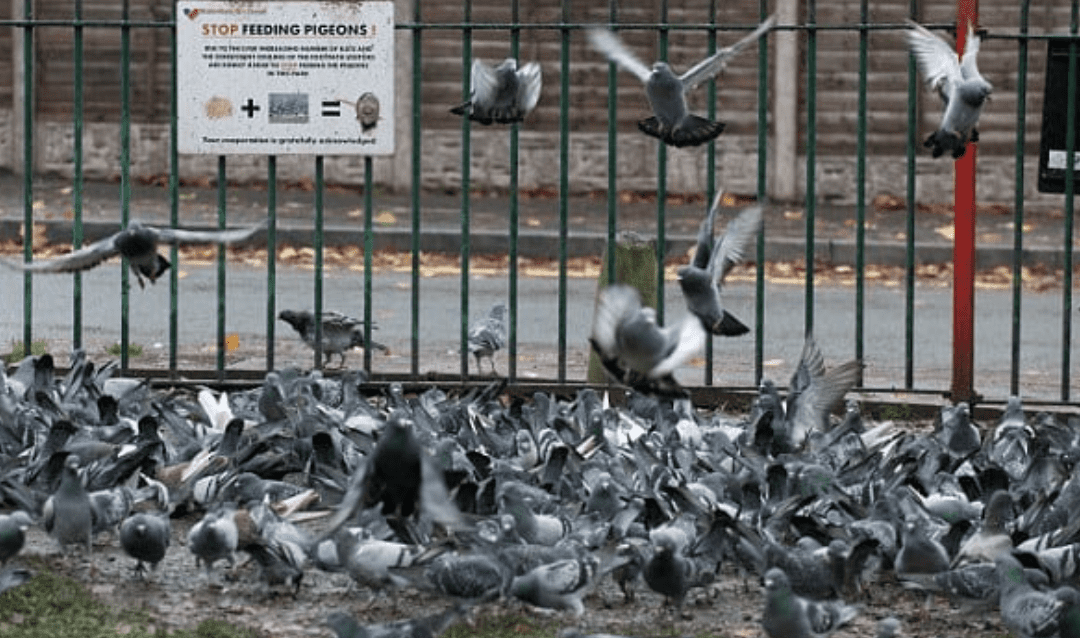
by Pigeon Patrol | Mar 7, 2022 | MBCA, pet bird, Pigeon Control, Pigeon Droppings, Pigeon Patrol's Services, Pigeon Predators
This morning as I was getting some worked finished, I noticed two crows on the roof across our ally. They had a large object which I first thought was something from the dumpster and then noticed what looked like it had chicken feet. I opened the window to get photos. Because it was cold out, the heat from my window made for some fierce shimmer and the photos are blurry…but you get the idea of what they are eating. Again, if you don’t like gross stuff, or don’t like the whole predator prey relationship thing, stop reading now.
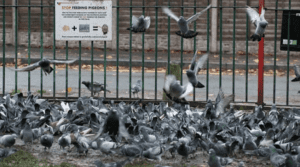
 When I first saw the feet, I was reminded of the quail that we get to feed the birds at The Raptor Center, but there are no quail around here. Then I realized that the bird the crows were eating had only pin feathers–it was a young bird from a nest. By the size, I realized that they were eating a pigeon nesting.
When I first saw the feet, I was reminded of the quail that we get to feed the birds at The Raptor Center, but there are no quail around here. Then I realized that the bird the crows were eating had only pin feathers–it was a young bird from a nest. By the size, I realized that they were eating a pigeon nesting.
 The two crows made short order of the chick. By the size and development, I would guess that the pigeon was about ten days old–which is interesting in and of itself. If the pigeon chick was about ten days old, the egg would have been laid 18 days before that, so the pigeon parents were busy in early March–at least two snow storms ago.
The two crows made short order of the chick. By the size and development, I would guess that the pigeon was about ten days old–which is interesting in and of itself. If the pigeon chick was about ten days old, the egg would have been laid 18 days before that, so the pigeon parents were busy in early March–at least two snow storms ago.
The pigeon nest was tucked in a nook on the roof of an apartment building just to the right of where the crows were eating. I’ve seen pigeons in and out of there all winter and assumed roosting–I didn’t guess that they were on eggs last month.
 When the crows were finished, I went back to business in my apartment. About fifteen minutes later I found them working on another chick. That surprised me. It makes sense to clean out a whole robin nest–those are small chicks, but a pigeon chick is fairly large, I was surprised that they ate both nestlings right away, but when you find a huge protein source like that and you are in the process of laying eggs yourself, you’re not gonna be able to resist it.
When the crows were finished, I went back to business in my apartment. About fifteen minutes later I found them working on another chick. That surprised me. It makes sense to clean out a whole robin nest–those are small chicks, but a pigeon chick is fairly large, I was surprised that they ate both nestlings right away, but when you find a huge protein source like that and you are in the process of laying eggs yourself, you’re not gonna be able to resist it.
 And let’s keep in mind that this is gross and it may not be pretty to watch a crow clean out a nest–but they are not the only ones to do it. Blue jays do it, hawks do it, owls do it–even woodpeckers do it. Heck, even nut job humans in England do it. Crows are just more obvious about it.
And let’s keep in mind that this is gross and it may not be pretty to watch a crow clean out a nest–but they are not the only ones to do it. Blue jays do it, hawks do it, owls do it–even woodpeckers do it. Heck, even nut job humans in England do it. Crows are just more obvious about it.
Source
Pigeon Patrol Products & Services is the leading manufacturer and distributor of bird deterrent (control) products in Canada. Pigeon Patrol products have solved pest bird problems in industrial, commercial, and residential settings since 2000, by using safe and humane bird deterrents with only bird and animal friendly solutions. At Pigeon Patrol, we manufacture and offer a variety of bird deterrents, ranging from Ultra-flex Bird Spikes with UV protection, Bird Netting, 4-S Bird Gel and the best Ultrasonic and audible sound devices on the market today.
Voted Best Canadian wholesaler for Bird Deterrent products ten years in a row.
Contact us at 1- 877– 4– NO-BIRD, (604) 585-9279 or visit our website at www.pigeonpatrol.ca
Pigeon/Pigeon Patrol / Pigeons Roosting / Vancouver Pigeon Control /Bird Spikes / Bird Control / Bird Deterrent / Pigeon Deterrent? Surrey Pigeon Control / Pest /Seagull deterrent / Vancouver Pigeon Blog / Birds Inside Home / Pigeons in the cities / Ice Pigeons/ What to do about pigeons/ sparrows , Damage by Sparrows, How To Keep Raccoons Away, Why Are Raccoons Considered Pests/ De-fence / Pigeon Nesting/ Bird Droppings / Pigeon Dropping/ woodpecker control/ Professional Bird Control Company/ Keep The Birds Away/ Birds/rats/ seagull/pigeon/woodpecker/ dove/sparrow/pidgeon control/pidgeon problem/ pidgeon control/flying rats/ pigeon Problems/ bird netting/bird gel/bird spray/bird nails/ bird guard
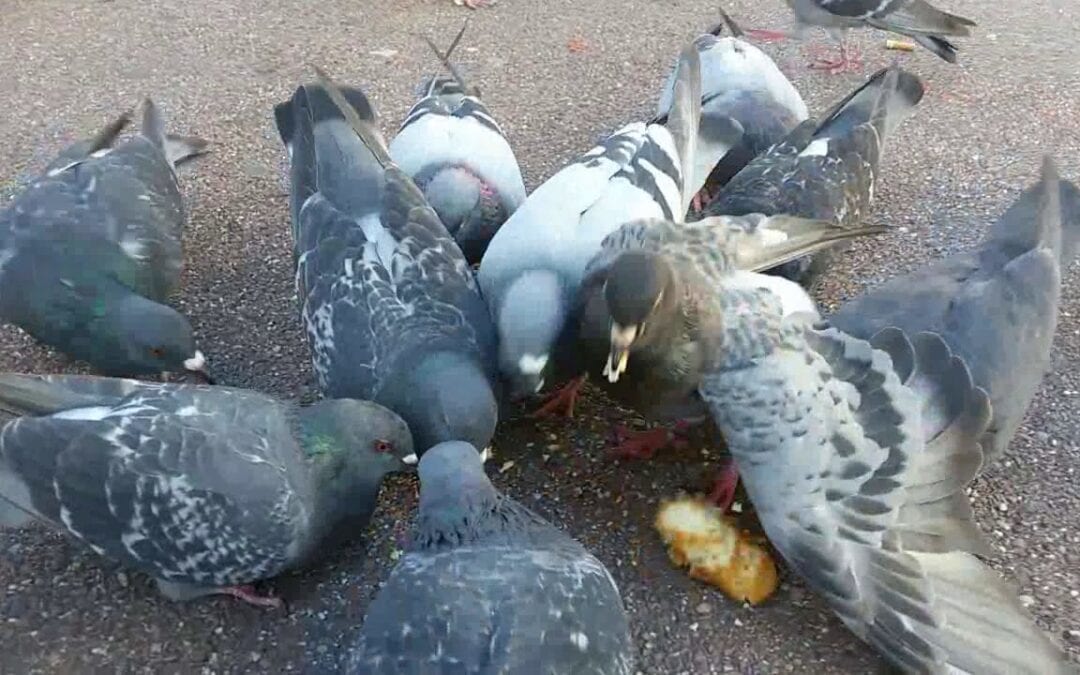
by Pigeon Patrol | Feb 22, 2022 | Bird Spike, Pigeon Patrol's Services, Pigeon Predators, Pigeon Spikes, Pigeons, Pigeons in the News
In his native Iran, Edwin Alexanderian said, pigeons are considered pets.
So about seven years ago, after seeing poisoned pigeons around his home in Brookline and along the street, Alexanderian decided to catch some of the birds and try to nurse them back to health.
When he’s successful, Alexanderian said, he releases the birds where he found them. If a pigeon does not recover completely, Alexanderian keeps it in a coop in his backyard. He now has about 80 pigeons.
“I decided to keep them because I don’t want to put them down,’’ he said.
But Alexanderian’s efforts to help the birds – which typically are poisoned in an effort to control the local population – are getting him in trouble with town officials. He was cited by the town because he never obtained a special permit for the shed-sized coop in his backyard. He’s also been warned by Brookline health officials that he doesn’t have the proper permit to keep the birds.
Health officials say neighbors have complained about a flock of pigeons hanging around Alexanderian’s Hammond Street home and defecating on neighboring rooftops.
“There is no other neighborhood that we have this going on,’’ said Pat Maloney, Brookline’s chief environmental health inspector.
Thomas French, assistant director of the state Division of Fisheries and Wildlife, said there is a chance that the pigeons being kept in a coop could attract other birds.
“They could be coming to visit,’’ French said. “That is a possibility.’’
But if a flock of pigeons are visiting Alexanderian’s coop, he said, they were probably already in the neighborhood and had not traveled a great distance.
Alexanderian, who is president of the Town Meeting Member Association in Brookline, said the pigeons flying around his neighborhood are not his birds, and blames the flock’s size on rat poison that was set out in the area and that has led to the deaths of most of the local hawks. Without the hawks, Alexanderian said, the pigeons have no predators to keep their numbers down.
Alexanderian said his pigeons are in his coop, and the reason he keeps so many of the birds is because once they’ve been poisoned, many are unable to fly long distances.
“They don’t die right away, it affects their brains,’’ Alexanderian said.
French said some poisons used on pigeons have neurological effects that make the birds act strangely and scare off other pigeons. He said MassWildlife issues permits for poisons to be used in an effort to keep pigeon populations at acceptable levels.
“I’ve never heard of anyone trying to intervene and save these birds,’’ French said.
But unless he can obtain the proper permits from the town, Alexanderian may not be able to rescue poisoned birds much longer.
Brookline’s zoning bylaws require that his pigeon coop be kept at least 100 feet away from neighboring properties, said Polly Selkoe, the town’s assistant director of regulatory planning.
Selkoe said Alexanderian’s property “is not really big enough to meet that’’ requirement, and he will need a special permit. Alexanderian said the building commission has already cited him for the coop, and he’s trying to obtain the special permit from the Zoning Board of Appeals.
Selkoe said Alexanderian’s hearing is Dec. 17. If he does get a special permit, Alexanderian would still need a permit from the town’s Board of Health to keep pigeons on his property, Maloney said.
While no one else in Brookline has a permit to keep pigeons, Maloney said, there are a handful of permits that have been issued for other animals, such as chickens, ducks and potbellied pigs.
Alexanderian said that he will fight to keep the pigeons, but if the town tells him he can’t keep them any more, he will release them.
“You think they got a problem now,’’ he said. “Wait until I release my sick birds.’’
Source
Pigeon Patrol Products & Services is the leading manufacturer and distributor of bird deterrent (control) products in Canada. Pigeon Patrol products have solved pest bird problems in industrial, commercial, and residential settings since 2000, by using safe and humane bird deterrents with only bird and animal friendly solutions. At Pigeon Patrol, we manufacture and offer a variety of bird deterrents, ranging from Ultra-flex Bird Spikes with UV protection, Bird Netting, 4-S Bird Gel and the best Ultrasonic and audible sound devices on the market today.
Voted Best Canadian wholesaler for Bird Deterrent products ten years in a row.
Contact us at 1- 877– 4– NO-BIRD, (604) 585-9279 or visit our website at www.pigeonpatrol.ca
Pigeon/Pigeon Patrol / Pigeons Roosting / Vancouver Pigeon Control /Bird Spikes / Bird Control / Bird Deterrent / Pigeon Deterrent? Surrey Pigeon Control / Pest /Seagull deterrent / Vancouver Pigeon Blog / Birds Inside Home / Pigeons in the cities / Ice Pigeons/ What to do about pigeons/ sparrows , Damage by Sparrows, How To Keep Raccoons Away, Why Are Raccoons Considered Pests/ De-fence / Pigeon Nesting/ Bird Droppings / Pigeon Dropping/ woodpecker control/ Professional Bird Control Company/ Keep The Birds Away/ Birds/rats/ seagull/pigeon/woodpecker/ dove/sparrow/pidgeon control/pidgeon problem/ pidgeon control/flying rats/ pigeon Problems/ bird netting/bird gel/bird spray/bird nails/ bird guard

by Pigeon Patrol | Feb 22, 2022 | history of pigeons, MBCA, pet bird, Pigeon Control, Pigeon Droppings, Pigeon Patrol's Services
Pirates, predators, power lines and poor luck — they brave it all for hundreds of miles, while carrying along the million-dollar hopes of the haves and have-nots. Pigeons are the new thoroughbreds in China and everyone has taken notice — breeders in Europe and even the feed industry in the United States.
Pigeon racing goes back hundreds of years and probably a lot longer. The races are held in countries across the globe, but the sport is at fever pitch in China. From Vice: “Twenty years ago — sort of a poor man’s delicacy, but now with the new Chinese economy, it’s become a rich man’s play thing.”
China’s nouveau riche love designer handbags, the finest wine, and sleek cars — but they’re also quick to slap down bags of cash on a pigeon. Money is swirling around Chinese pigeon racing, and the torrent shows no signs of abatement. In 2011, a Chinese entrepreneur payed $200,000 for a pigeon — Blue Prince — at PiPa, the world’s premier pigeon auction house located in Belgium. PiPa sold 218 pigeons that day — for an astounding $1.8 million.
And in 2013, PiPa sold Bolt (named after Olympic sprinter Usain Bolt) to another Chinese businessman for $400,000. An entire lot of 530 Belgian-bred pigeons went for almost $6 million that day, with nine of the 10 most expensive birds headed to China or Taiwan. (In 2009, The Telegraph reported that Chinese mafia gangs were hitting Belgian pigeon coops and stealing the prized birds. “Rather than attempting to smuggle their prey abroad, criminals will kill the pigeons and cut of their identifying rings to be used on much less valuable birds bred in Asia.”)
Blue Prince, Bolt and the other auction birds weren’t bought to race; they are strictly for breeding. As PiPa’s Ya Minna told The Independent, “A pigeon is a far better investment than a fine bottle of vintage wine. You can breed it; it will have children and grandchildren.”
Pigeons may look ordinary, but the actual races are a subculture of chaos. With entry fees ranging from a $200-$1,000, several thousand birds are loaded onto a communal truck and the trek to the starting line begins. The winner will not be the first pigeon to return. The birds are all banded with GPS locators and when they arrive home at their individual coops, a scanner records the arrival time and the winner is determined according to which pigeon flew home at the highest average speed. (This is a sport tailor-made for hijinks and corruption.)

The long haul home
The truck may drive 500-700 miles away, and then the birds are released as the marathon begins. Pigeon pirates are on alert, hoping to catch returning birds to sell on the black market; hawks are always on the prowl; bad weather may claim birds; and disorientation may be a factor.
This is no horse race with a two-minute hurtle towards euphoria or dejection; it’s a dry-mouth game of patience for the pigeon owners and bettors. The wait will last hours; and depending on whether it gets dark and the pigeons roost, it may lapse into the next day.
When the birds arrive home (the strongest birds will fly 600 miles without stopping), the tabulations are made, and the results are announced over the Internet and text. The winners gloat and count their cash; the losers lick their wounds; and the breeding begins.
With the glut of cash in Chinese pigeon racing, the U.S. feed industry has taken note. Jos Zamzow, Meridian, Idaho, believes his family company, Dynamite Marketing, has perfected a high-performance pigeon feed. The News Tribune reports that Zamzow’s first test shipments of the feed concoction will arrive in Taiwan this summer. “After they start winning races, we expect there will be significant demand … pigeon racing is popular all over Asia.”
Zamzow already markets pet and pork feed in Taiwan. “Now Zamzow is betting that Dynamite can transform Idaho-grown safflower and corn — and a top-secret, blood-boosting brew of mushroom powder and yeast cell wall extract it makes in its 102-year-old feed mill — into an annual export business worth up to $15 million.”
Spiraling pigeon auction prices, criminal bird gangs, and a mad gambling boom — a fitting backdrop for a capitalist sport once banned by Chairman Mao.
Source
Pigeon Patrol Products & Services is the leading manufacturer and distributor of bird deterrent (control) products in Canada. Pigeon Patrol products have solved pest bird problems in industrial, commercial, and residential settings since 2000, by using safe and humane bird deterrents with only bird and animal friendly solutions. At Pigeon Patrol, we manufacture and offer a variety of bird deterrents, ranging from Ultra-flex Bird Spikes with UV protection, Bird Netting, 4-S Bird Gel and the best Ultrasonic and audible sound devices on the market today.
Voted Best Canadian wholesaler for Bird Deterrent products ten years in a row.
Contact us at 1- 877– 4– NO-BIRD, (604) 585-9279 or visit our website at www.pigeonpatrol.ca
Pigeon/Pigeon Patrol / Pigeons Roosting / Vancouver Pigeon Control /Bird Spikes / Bird Control / Bird Deterrent / Pigeon Deterrent? Surrey Pigeon Control / Pest /Seagull deterrent / Vancouver Pigeon Blog / Birds Inside Home / Pigeons in the cities / Ice Pigeons/ What to do about pigeons/ sparrows , Damage by Sparrows, How To Keep Raccoons Away, Why Are Raccoons Considered Pests/ De-fence / Pigeon Nesting/ Bird Droppings / Pigeon Dropping/ woodpecker control/ Professional Bird Control Company/ Keep The Birds Away/ Birds/rats/ seagull/pigeon/woodpecker/ dove/sparrow/pidgeon control/pidgeon problem/ pidgeon control/flying rats/ pigeon Problems/ bird netting/bird gel/bird spray/bird nails/ bird guard
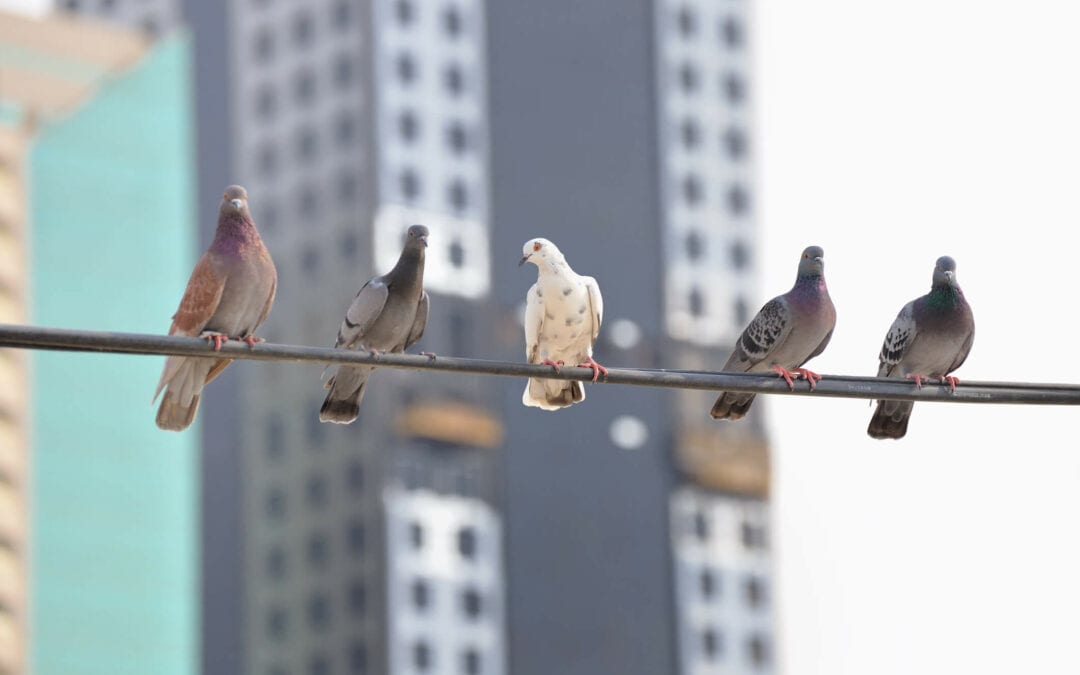
by Pigeon Patrol | Feb 16, 2022 | history of pigeons, MBCA, pet bird, Pigeon Control, Pigeon Droppings, Pigeon Patrol's Services, Pigeon Predators
Every spring, down-covered mallard ducklings follow their mother across a pond. Goslings graze along side their Canada Geese parents in waterfront parks. Baby chickens peck the ground soon after hatching. But why do we never see baby pigeons?
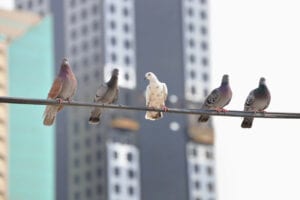
Some baby birds—like those down-covered ducks, geese, and chickens—leave their nest shortly after hatching and do a lot of growing up while following their parents around. Others, like pigeons, stay in the nest and depend on their parents to feed and protect them, well into their youth.
When young Rock Pigeons finally leave the nest, they are full sized with adult feathers, and they look like their parents. So unless you look carefully under a city bridge, you aren’t likely to ever see a baby pigeon.
It’s easy to imagine, when hearing soft cooing sounds like these, why baby pigeons would rather stay in the nest. But the reason is they wait to fledge until they are nearly independent and the task of getting on with life is a bit easier.
Source
Pigeon Patrol Products & Services is the leading manufacturer and distributor of bird deterrent (control) products in Canada. Pigeon Patrol products have solved pest bird problems in industrial, commercial, and residential settings since 2000, by using safe and humane bird deterrents with only bird and animal friendly solutions. At Pigeon Patrol, we manufacture and offer a variety of bird deterrents, ranging from Ultra-flex Bird Spikes with UV protection, Bird Netting, 4-S Bird Gel and the best Ultrasonic and audible sound devices on the market today.
Voted Best Canadian wholesaler for Bird Deterrent products ten years in a row.
Contact us at 1- 877– 4– NO-BIRD, (604) 585-9279 or visit our website at www.pigeonpatrol.ca
Pigeon/Pigeon Patrol / Pigeons Roosting / Vancouver Pigeon Control /Bird Spikes / Bird Control / Bird Deterrent / Pigeon Deterrent? Surrey Pigeon Control / Pest /Seagull deterrent / Vancouver Pigeon Blog / Birds Inside Home / Pigeons in the cities / Ice Pigeons/ What to do about pigeons/ sparrows , Damage by Sparrows, How To Keep Raccoons Away, Why Are Raccoons Considered Pests/ De-fence / Pigeon Nesting/ Bird Droppings / Pigeon Dropping/ woodpecker control/ Professional Bird Control Company/ Keep The Birds Away/ Birds/rats/ seagull/pigeon/woodpecker/ dove/sparrow/pidgeon control/pidgeon problem/ pidgeon control/flying rats/ pigeon Problems/ bird netting/bird gel/bird spray/bird nails/ bird guard











